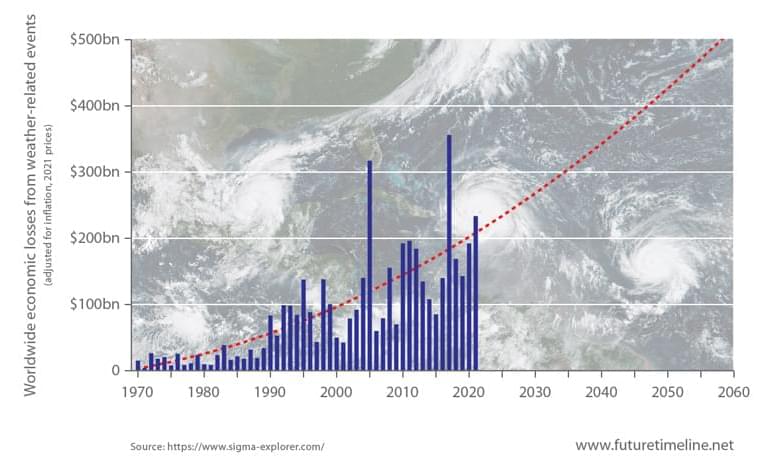National Hurricane Center data for Miami, Washington, D.C., and New York City show development happening in at-risk areas, even as climate change brings more frequent and intense storms.



This graph shows the worldwide economic losses from weather-related events, from 1970 through to the present day, with a future trend projected out to 2060.
The data here is from Swiss Re, the world’s largest reinsurer, and is adjusted for inflation at 2021 prices. It excludes non-weather disasters, such as earthquakes, tsunamis, and volcanic eruptions.
A significant gap exists between the total economic damages and the losses protected by insurance. For example, the worldwide figure for weather-related disasters in 2021 amounted to $233.27 billion, of which insurance covered “only” $101.12 billion.

A new study finds that decarbonization pathways need to incorporate more efficient electric heating technologies and more renewable energy sources to minimize strain on the U.S. electric grid during increased electricity usage from heating in December and January. Otherwise, harmful fossil fuels will continue to power these seasonal spikes in energy demand.
Buildings’ direct fossil fuel consumption, burned in water heaters, furnaces, and other heating sources, accounts for nearly 10 percent of greenhouse gas emissions in the United States. Switching to an electric system that powers heating through renewable energy sources, rather than coal, oil, and natural gas—the process known as building electrification or building decarbonization—is a crucial step towards achieving global net-zero climate goals.
However, most building decarbonization models have not accounted for seasonal fluctuations in energy demand for heating or cooling. This makes it difficult to predict what an eventual switch to cleaner, all-electric heating in buildings could mean for the nation’s electrical grid, especially during peaks in energy use.


A volcano on Japan’s western major island of Kyushu, called Sakurajima, erupted at about 8:05 p.m. (1105 GMT) on Sunday, the Japanese Meteorological Agency (JMA) said, but media said there were no immediate reports of damage.
There were reports of volcanic stones raining down at a distance of 2.5 km (1.5 miles) from the volcano, NHK public television said. The eruption alert level has been raised to 5, the highest, with some areas advised to evacuate, NHK said. Sakurajima is one of Japan’s most active volcanoes and eruptions of varying levels are frequent. In 2019 it spewed ash 5.5 km (3.4 miles) high.

At the time climate change was only beginning to be talked about in the scientific community as well as behind the scenes among researchers working for fossil fuel companies.
Climate change fit the EPA’s mandate. And unlike an oil or chemical spill, no reputable scientist would see climate change as equivalent to “the crisis of the day.” But this phrase appears in Chief Justice John Roberts’ opinion justifying the decision in West Virginia v. EPA to deny the Agency its power to regulate carbon emissions from coal-fired power plants which based on the mandated powers described above is its purview (see points 3, 4, and 5).



Mesmerising aerial footage has captured a huge swarm of jellyfish off the coast of Israel.
The country’s marine authorities were inspecting the waters of Haifa Bay during the annual jellyfish migration, when its boat was surrounded.
Israel Parks and Nature Authority said that pollution and climate change are increasing the intensity of the jellyfish swarms.
